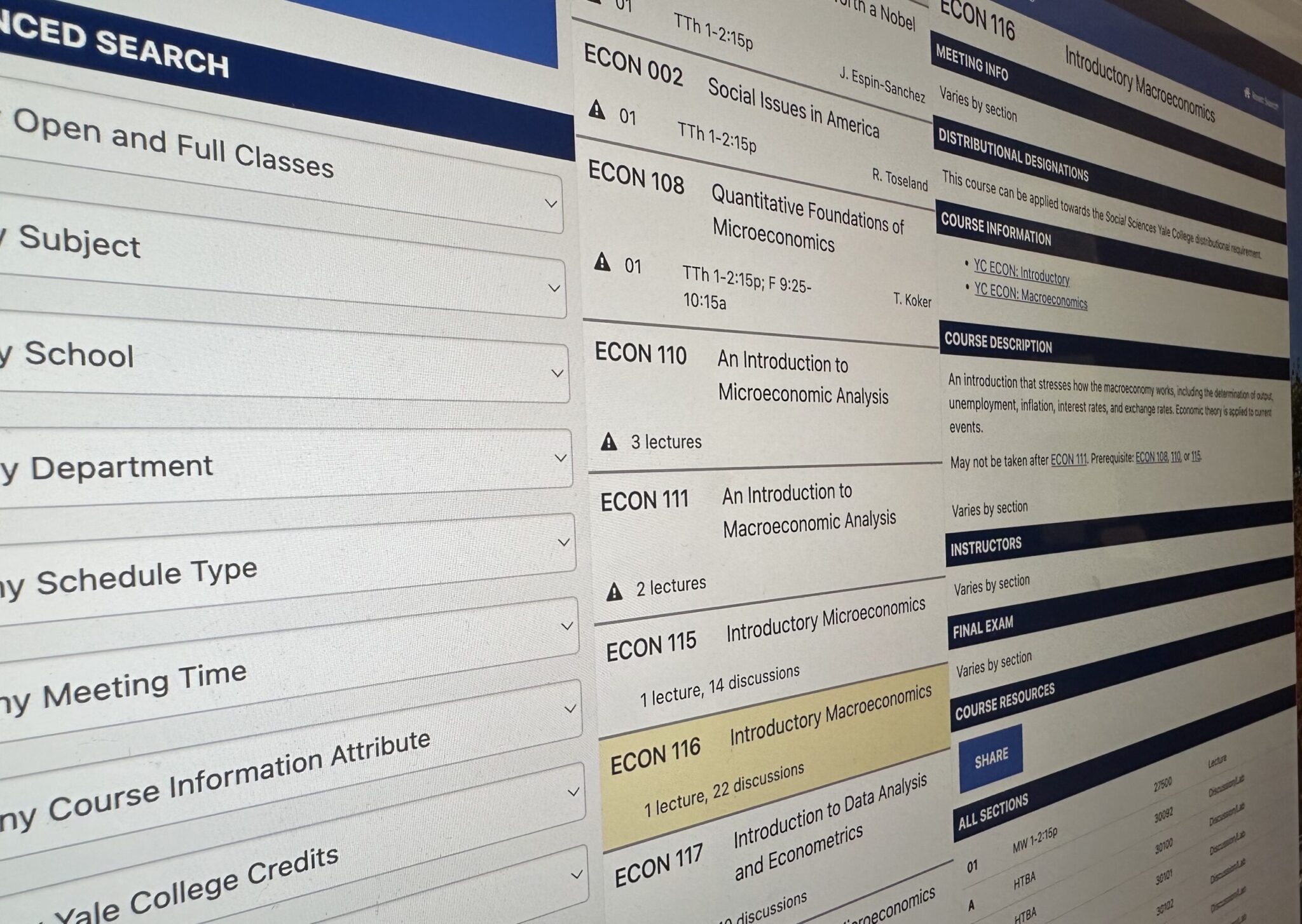Economics, political science classes see highest enrollments in spring 2024
The three classes with the highest enrollment this semester — Introductory Macroeconomics, Bioethics and Law and Intermediate Macroeconomics — have drawn hundreds of students.

Samad Hakani, Photography Editor
With the conclusion of add/drop period on Tuesday, registrar data reveal the most popular Yale College courses for the spring 2024 semester. The top three include two macroeconomics lecture courses and “Bioethics and Law,” a lecture course in the political science department.
Topping the list is “Introductory Macroeconomics” — a foundational economics lecture taught by economics professor Fabrizio Zilibotti — with 344 students enrolled. “Bioethics and Law,” with 288 students, is the second, taught by Stephen Latham, a professor of political science and director of Yale’s Interdisciplinary Center of Bioethics. The course focuses on “the treatment by American law of major issues in contemporary biomedical ethics,” according to the class’ description on course search. “Intermediate Macroeconomics,” taught by economics professor Marnix Amand, has the third highest enrollment.
Zilibotti wrote to the News that his course prepares students to understand the world we live in — a world where economics is “pervasive.”
“The course provides the basic tools for understanding the daily debate on very topical questions in our society: growth, unemployment, inequality, inflation, poverty,” he wrote.
Zilibotti aims to keep his course relevant and resonant to our moment in history, he added.
He also wrote to the News that he bases discussion on recent trends including the COVID-19 pandemic, the financial crisis of 2007-08 and recent trends in income inequality.
Zilibotti said that he believes his course, as well as “Introductory Microeconomics,” are popular because they are requirements for the Economics major, though his course attracts students in other majors.
Due to the course’s popularity, it uses a team of instructors, including course director William Hawkins, as well as teaching fellows and peer tutors.
Because of the class’s breadth, Zilibotti wrote that his class does not have enough time to go into great depth on any of the covered topics, though he mentioned that more advanced courses are designed for that purpose.
Ryan Kulsakdinun ’27 described “Introductory Macroeconomics” as “welcoming” due to its “low commitment” structure. The class meets twice a week for 75-minute lectures as well as for weekly 50-minute sections.
Kulsakdinun told the News his main reason for enrolling in the class was for his combined major, Computer Science and Economics.
“Having a good foundation of micro and macro is really important,” Kulsakdinun said, “And I thought taking a macroeconomics class at the college level would be helpful.”
“Bioethics and Law,” the second most popular course, is a social science course that focuses on timely and relevant issues in medicine, such as abortion access, professor Stephen Latham wrote to the News.
“With the overturning of Roe v. Wade, states are going in wildly different directions with abortion rights,” he wrote. “So, a very large proportion of the topics we talk about in class show up in the headlines every week.”
Latham hopes that the course will equip students with skills and knowledge to argue their positions on bioethical matters thoughtfully, discussing issues such as abortion, assisted reproduction, medical aid in dying and public health responses during pandemics.
In the class, he also teaches about how the American legal debate on healthcare issues differs from that in other countries.
Dean Centa ’25 is enrolled in “Intermediate Macroeconomics,” the class with the third-highest enrollment this semester. Although not originally keen to take the course, Centa told the News he took the class because it is a requirement for his major, adding that many seniors in the class held off taking the requirement until their final semester.
Giovanni Maggi, the director of undergraduate studies for economics, wrote to the News that the reason for the rising interest in economics is multifaceted.
“I have to be a good economist here,” he wrote to the News. “The question of what explains the high and growing popularity of economics courses is not an obvious one, and it would take a rigorous empirical investigation to understand the causes of this phenomenon.”
Still, he cited some factors that may have influenced the department’s popularity: excellent job and research opportunities, high quality of teaching and the fact that certain economics classes are compulsory for majors, including global affairs and economics.
Centa shared similar perspectives to those of Zilibotti, saying that some students take these economics courses out of curiosity, but most take it as a requirement.
“If you go on Coursetable, and look at the reviews, everyone is just taking it because it is a requirement,” Centa told the News.
Centa also told the News that first years and sophomores interested in economics start with “Introductory Microeconomics,” “Introductory Macroeconomics” and onto “Intermediate Macroeconomics” during their Yale career.
Sean Barrett’s “General Physics Laboratory” and Steve Chang’s “Cognitive Neuroscience” were the fourth and fifth most popular courses, with 247 and 243 students respectively.







